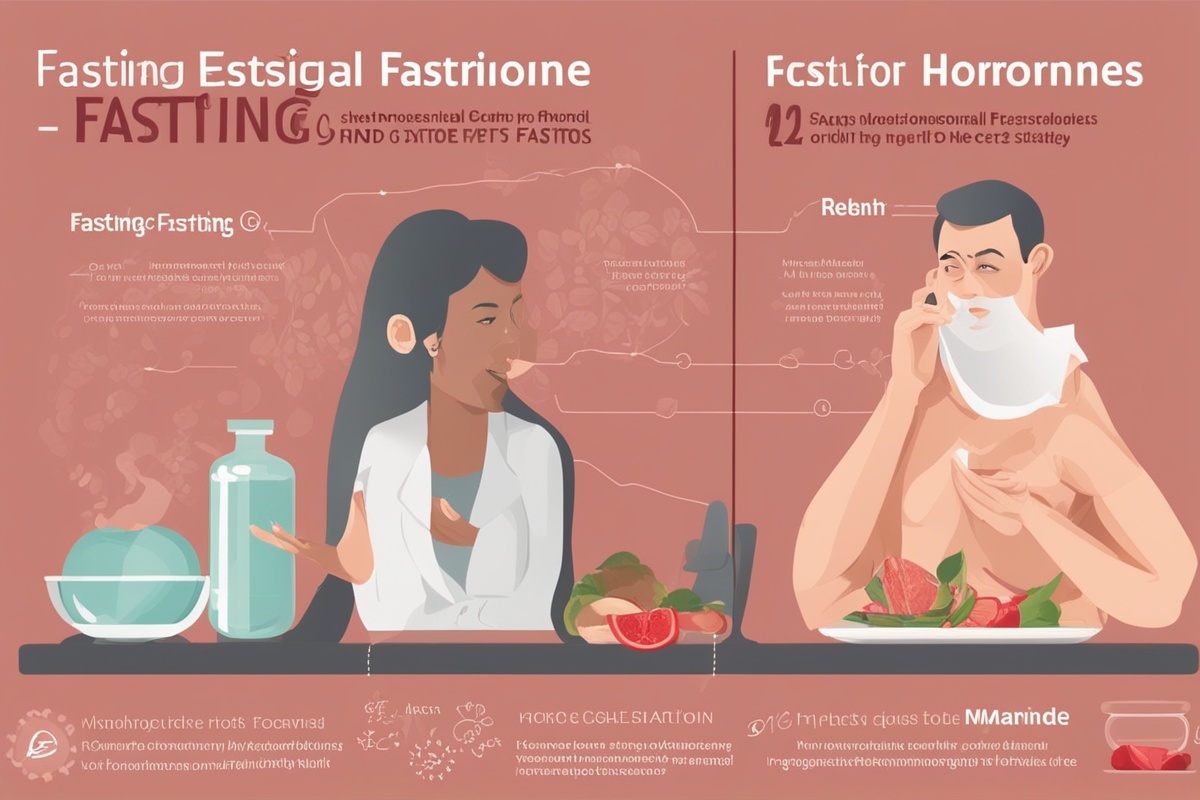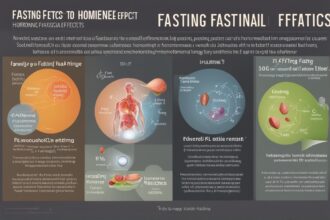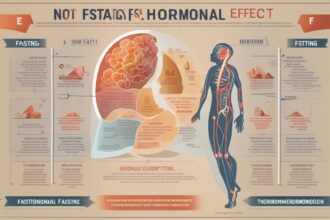Fasting has taken the health and wellness world by storm, with practices like intermittent fasting, time-restricted eating, and extended fasts becoming go-to strategies for weight loss, mental clarity, and overall well-being. But have you ever wondered what’s happening beneath the surface—specifically, how hormones and fasting are intertwined? Hormones are the body’s chemical messengers, regulating everything from metabolism to mood, and fasting can have a profound impact on their balance. In this deep dive, we’ll explore the fascinating hormonal effects of fasting, backed by science, and share practical tips to help you fast smarter. Whether you’re a beginner or a seasoned faster, understanding these hormonal shifts can make all the difference in achieving your health goals.
The Science Behind Hormones and Fasting
When you fast, your body undergoes a metabolic switch, moving from using readily available glucose for energy to tapping into stored fats. This shift doesn’t happen in isolation—it’s orchestrated by a symphony of hormones that respond to the absence of food. Key players like insulin, glucagon, cortisol, and growth hormone adjust to maintain energy balance and protect vital functions. For instance, insulin levels drop during fasting, signaling the body to break down stored energy, while glucagon rises to stimulate glucose release from the liver (Cahill, 2006). This hormonal dance is what makes fasting such a powerful tool, but it also underscores the need for a thoughtful approach to avoid potential imbalances.
Key Hormones Affected by Fasting
Let’s break down the specific hormones influenced by fasting and how they adapt to periods of food restriction. Each hormone plays a unique role, and their responses can vary based on the type and duration of fasting, as well as individual factors like age and health status.
- Insulin: This hormone regulates blood sugar levels. During fasting, insulin decreases significantly, promoting fat-burning as the body switches to alternative fuel sources (Meijssen et al., 2001).
- Ghrelin: Often called the “hunger hormone,” ghrelin typically increases during fasting, signaling the brain to seek food. However, studies suggest it may decrease during prolonged fasts (Cummings et al., 2001).
- Cortisol: Known as the stress hormone, cortisol can rise during fasting to help maintain blood sugar levels by breaking down proteins. This can be beneficial short-term but risky if elevated chronically (Bergendahl et al., 2000).
- Human Growth Hormone (HGH): Fasting boosts HGH secretion, which supports tissue repair and fat metabolism, contributing to the anti-aging benefits often associated with fasting (Ho et al., 1988).
Benefits of Hormonal Changes During Fasting
The hormonal shifts triggered by fasting aren’t just biological curiosities—they come with tangible health benefits when managed correctly. For many, the interplay between hormones and fasting is a gateway to improved metabolic health and beyond. Here are some of the standout advantages:
- Enhanced Fat Loss: Lower insulin levels during fasting facilitate lipolysis, the breakdown of fat stores for energy, making it an effective strategy for weight management (Anton et al., 2018).
- Improved Insulin Sensitivity: Reduced insulin exposure over time can enhance the body’s response to this hormone, potentially lowering the risk of type 2 diabetes.
- Cellular Repair: Elevated HGH and decreased insulin promote autophagy, a process where cells recycle damaged components, which may support longevity.
- Mental Clarity: Some report sharper focus during fasting, possibly due to stabilized blood sugar and reduced inflammation driven by hormonal balance.
- Stress Resilience: Moderate cortisol increases during short-term fasting can improve the body’s adaptive response to stress, though balance is key.
Potential Risks and Hormonal Imbalances
While the benefits of fasting are compelling, it’s not a one-size-fits-all solution. The hormonal effects of fasting can sometimes veer into risky territory, especially if fasting is done excessively or without proper preparation. For instance, prolonged fasting can lead to sustained cortisol elevation, which may contribute to muscle loss, fatigue, or even anxiety (Bergendahl et al., 2000). Women, in particular, may experience disruptions in reproductive hormones like estrogen and progesterone, potentially affecting menstrual cycles or fertility. It’s also worth noting that individuals with pre-existing conditions like diabetes or thyroid disorders should approach fasting with caution, as hormonal fluctuations can exacerbate symptoms. Listening to your body and consulting a healthcare provider before diving into extended fasting protocols is crucial to avoid these pitfalls.
Practical Tips for Balancing Hormones While Fasting
Navigating the relationship between hormones and fasting doesn’t have to be daunting. With a few actionable strategies, you can harness the benefits while minimizing risks. I’ve put together some tips based on both research and real-world experience to help you fast in a way that supports hormonal health. After all, the goal isn’t just to skip meals—it’s to optimize how your body responds.
First, start slow. If you’re new to fasting, jumping into a 24-hour fast might shock your system and spike stress hormones like cortisol. Begin with a 12:12 schedule—12 hours of eating followed by 12 hours of fasting—and gradually increase the fasting window as your body adjusts. Hydration is also non-negotiable; dehydration can exacerbate hormonal imbalances, so aim to drink plenty of water, and consider adding electrolytes during longer fasts. Nutrition matters too—when you do eat, focus on nutrient-dense foods like healthy fats, lean proteins, and complex carbs to stabilize blood sugar and support hormone production. For women, syncing fasting with your menstrual cycle can help; some find fasting easier in the follicular phase (post-menstruation) when energy levels are higher.
Lastly, don’t ignore rest. Sleep is a powerful regulator of hormones like ghrelin and cortisol, so aim for 7–9 hours nightly to complement your fasting efforts. If you feel overly hungry, fatigued, or irritable, take it as a sign to break your fast or adjust your approach. Remember, fasting should feel sustainable, not punishing. By prioritizing balance, you can ensure that fasting and hormonal health go hand in hand.
Who Should Be Cautious with Fasting?
Fasting isn’t for everyone, and certain groups need to be especially mindful of how hormones and fasting interact. If you fall into one of these categories, it’s wise to consult a doctor or dietitian before starting any fasting regimen. Hormonal responses are highly individual, and what works for one person might be harmful to another. For example, pregnant or breastfeeding women should generally avoid fasting, as caloric restriction can affect maternal and fetal health by altering key hormones. Similarly, individuals with a history of eating disorders may find that fasting triggers unhealthy patterns or hormonal dysregulation. Those on medications for diabetes or thyroid conditions also need tailored guidance, as fasting can interfere with drug efficacy and hormone levels (Anton et al., 2018). The key takeaway? Personalization is everything—know your body, and don’t hesitate to seek professional advice.
As we’ve explored, the connection between hormones and fasting is both complex and powerful. From insulin’s role in fat-burning to cortisol’s influence on stress, fasting reshapes the hormonal landscape in ways that can transform your health—for better or worse. The benefits, like enhanced metabolism and cellular repair, are backed by science and real-world success stories, but so are the risks, especially if fasting is approached recklessly. By starting slow, staying hydrated, prioritizing nutrition, and listening to your body’s signals, you can make fasting a sustainable part of your lifestyle while keeping hormonal balance in check. Whether you’re fasting for weight loss, mental clarity, or longevity, understanding these hormonal effects empowers you to make informed choices. So, are you ready to experiment with fasting in a way that works for your unique body? Share your thoughts or experiences in the comments—I’d love to hear how fasting has impacted your hormonal health!
References
- Anton, S. D., Moehl, K., Donahoo, W. T., Marosi, K., Lee, S. A., Mainous, A. G., … & Mattson, M. P. (2018). Flipping the metabolic switch: Understanding and applying the health benefits of fasting. Obesity, 26(2), 254-268. https://doi.org/10.1002/oby.22065
- The Journal of Clinical Endocrinology & Metabolism, 85(1), 275-281. https://doi.org/10.1210/jcem.85.1.6299
- Cahill, G. F. (2006). Fuel metabolism in starvation. Annual Review of Nutrition, 26, 1-22. https://doi.org/10.1146/annurev.nutr.26.061505.111258
- Cummings, D. E., Purnell, J. Q., Frayo, R. S., Schmidova, K., Wisse, B. E., & Weigle, D. S. (2001). A preprandial rise in plasma ghrelin levels suggests a role in meal initiation in humans. Diabetes, 50(8), 1714-1719. https://doi.org/10.2337/diabetes.50.8.1714
- Ho, K. Y., Veldhuis, J. D., Johnson, M. L., Furlanetto, R., Evans, W. S., Alberti, K. G., & Thorner, M. O. (1988). Fasting enhances growth hormone secretion and amplifies the complex rhythms of growth hormone secretion in man. The Journal of Clinical Investigation, 81(4), 968-975. https://doi.org/10.1172/JCI113450
- Meijssen, S., Cabezas, M. C., Ballieux, M. J., Derksen, R. J., Bilecen, S., & Erkelens, D. W. (2001). Insulin mediated inhibition of hormone sensitive lipase activity in vivo in relation to endogenous catecholamines in healthy subjects. The Journal of Clinical Endocrinology & Metabolism, 86(9), 4193-4197. https://doi.org/10.1210/jcem.86.9.7794






